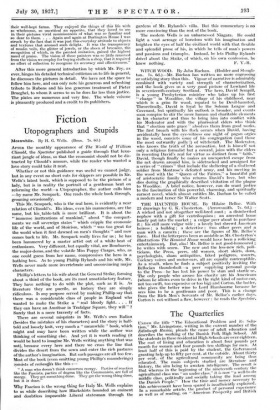The Quarterlies
UNDER the title " The Educational Problem and its Solu- tion," Mr. Livingstone, writing in the current number of the Edinburgh Review, pleads the cause of adult education and describes the working of the Danish Folk High School. All the students in these residential High Schools are over eighteen. The cost of living and education is about four pounds per. month for women and four pounds ten shillings for men. At least half of this is paid by the student, the Go+ernment granting help up to fifty per cent. at the outside. About thirty per cent.- of the agricultural community are being thus educated. The main subjects studied are literature and history, the aim being to awaken intelligence. The result is that whereas in the beginning of the nineteenth century the agricultural class was "an under class," it is now "a well-to-do middle class, politically and socially taking the lead among the Danish People." How the time and money necessary to this achievement have been spared is insufficiently explained. In a remarkable article, the product of personal experience as well as of reading, on " American Prosperity and British Industry " Dr. Northcott tells of American wages and savings- bank accounts in a manner to make an Englishman's mouth water. He seems to think that we might be in an equal state of prosperity if we could but compose our differences and put our backs into our work, learning as America has learned to prefer " more goods to more leisure." In the first article in the Quarterly Review Lord Sydenham deals with " Mr. Churchill as Historian." " Mr. Churchill's two final volumes complete a work in which the interest never flags," he declares, adding that " as a descriptive writer he has few if any equals." On the other hand, Lord Sydenham finds in the book " bias in plenty, which leads to judgments -challenging criticism," while a far-ranging imagination induces speculations into the " might have beens which in war as in politics may be barren of profit as well as misleading." In 4' The Problem of Disarmament," Mr. Luigi Villari urges " a disarmament of the spirit," and deprecates " material dis- armament," admitting, however, the desirability of fixing, were it possible, a maximum limit of armaments beyond which no Power should be allowed to go. Professor Arthur Thomson contributes a very interesting paper on "Animal Behaviour," describing experiments bearing on vexed questions of instinct, intelligence, and reasoning power. By intelligence as distinct from reason he means perceptional inference." Apes, he thinks, are not capable of experimenting with general ideas and concepts," and cannot therefore be said to reason in the sense that man reasons.



































 Previous page
Previous page